| Revision as of 13:49, 29 October 2013 editCollingwood26 (talk | contribs)1,072 edits Undid revision 579251945 by HiLo48 (talk)Can we get an admin in here← Previous edit | Revision as of 20:03, 29 October 2013 edit undoHiLo48 (talk | contribs)Extended confirmed users, Pending changes reviewers, Rollbackers91,247 edits Don't be so fucking stupid!!!! Maybe Menzies did it. Nobody is agreeing with you on the Talk page or here. Take you Lib loving elsewhere.Next edit → | ||
| Line 611: | Line 611: | ||
| | rowspan="2"| | | rowspan="2"| | ||
| |- | |- | ||
| | colspan="6" |{{small|Elected ]. ] initiative to stop boats carrying asylum seekers. |
| colspan="6" |{{small|Elected ]. ] initiative to stop boats carrying asylum seekers.}} | ||
| |} | |} | ||
Revision as of 20:03, 29 October 2013
Below is a list of Prime Ministers of the Commonwealth of Australia.
The parties shown are those to which the prime ministers belonged at the time they held office and the electoral divisions shown are those they represented while in office. Several prime ministers belonged to parties other than those given and represented other electorates before and after their prime ministerships.
List
Colour key
(for political parties)
| # | Name (Birth–Death) |
Portrait | Division | Party | Term of office | Election | Ministry | Ref | |
|---|---|---|---|---|---|---|---|---|---|
| rowspan="2" style="background:Template:Protectionist Party/meta/color; color:white;" |1 | Sir Edmund Barton (1849–1920) |
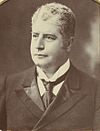
|
MP for Hunter, NSW, 1901–1903 (resigned) |
Protectionist | 1 January 1901 |
24 September 1903 |
1901 | Barton | |
| First Australian Prime Minister, appointed in lieu of William Lyne after the Hopetoun Blunder. Elected 1901 (inaugural federal election). Introduced Immigration Restriction Act 1901 to limit non-European settlement of Australia (commonly known as the White Australia Policy). Retired to pursue judicial career. | |||||||||
| rowspan="2" style="background:Template:Protectionist Party/meta/color; color:white;" |2 | Alfred Deakin (1856–1919) |

|
MP for Ballaarat, Vic, 1901–1913 (retired) |
Protectionist | 24 September 1903 |
27 April 1904 |
1903 | 1st Deakin | |
| Elected 1903; three-way hung Parliament, with government reliant on Labor support. Unable to pass any legislation; resigned. | |||||||||
| rowspan="2" style="background:Template:Australian Labor Party/meta/color; color:white;" |3 | Chris Watson (1867–1941) |

|
MP for Bland, NSW, 1901–1906 MP for South Sydney, NSW, 1906–1910 (retired) |
Labor | 27 April 1904 |
18 August 1904 |
— | Watson | |
| First Labor Prime Minister in the world. Enacted tax reforms. Minority government; sought a double dissolution to allow an election; refused by the Governor-General; resigned. | |||||||||
| rowspan="2" style="background:Template:Free Trade Party/meta/color;" |4 | Sir George Reid (1845–1918) |

|
MP for East Sydney, NSW, 1901–1909 (resigned) |
Free Trade | 18 August 1904 |
5 July 1905 |
— | Reid | |
| Premier of New South Wales 1894–1899; first former state premier to become Prime Minister. Minority government; resigned when Protectionists and Labor formed an alliance. | |||||||||
| rowspan="3" style="background:Template:Protectionist Party/meta/color; color:white;" |(2) | Alfred Deakin (1856–1919) |

|
MP for Ballaarat, Vic, 1901–1913 (retired) |
Protectionist | 5 July 1905 |
13 November 1908 |
— | 2nd Deakin | |
| 1906 | 3rd Deakin | ||||||||
| Re-elected 1906. Passed extensive legislation; Arranged for Australian control of Papua and Northern Territory; expanded High Court to five justices. | |||||||||
| rowspan="2" style="background:Template:Australian Labor Party/meta/color; color:white;" |5 | Andrew Fisher (1862–1928) |

|
MP for Wide Bay, Qld, 1901–1915 (resigned) |
Labor | 13 November 1908 |
2 June 1909 |
— | 1st Fisher | |
| Seat of Government Act, providing for a federal capital at Canberra; Workers' wage reform; Prepared for establishment of the Navy. Ousted by Parliamentary majority held by the newly merged Commonwealth Liberal Party. | |||||||||
| rowspan="2" style="background:Template:Commonwealth Liberal/meta/color; color:white;" |(2) | Alfred Deakin (1856–1919) |

|
MP for Ballaarat, Vic, 1901–1913 (retired) |
Commonwealth Liberal | 2 June 1909 |
29 April 1910 |
— | 4th Deakin | |
| Deakin's Protectionist Party had merged with Joseph Cook's Anti-Socialist Party, resulting in the first absolute majority government. Ordered the battle cruiser HMAS Australia; coordinated Financial Agreement of 1909, granting the states 25 shillings per head per annum. Defeated 1910. | |||||||||
| rowspan="2" style="background:Template:Australian Labor Party/meta/color; color:white;" |(5) | Andrew Fisher (1862–1928) |

|
MP for Wide Bay, Qld, 1901–1915 (resigned) |
Labor | 29 April 1910 |
24 June 1913 |
1910 | 2nd Fisher | |
| Elected 1910; absolute majority. Instigated social and financial reform, including Australia's first paper currency. Defeated 1913. | |||||||||
| rowspan="2" style="background:Template:Commonwealth Liberal/meta/color; color:white;" |6 | Joseph Cook (1860–1947) |

|
MP for Parramatta, NSW, 1901–1921 (resigned) |
Commonwealth Liberal | 24 June 1913 |
17 September 1914 |
1913 | Cook | |
| Elected 1913 with a one-seat majority; Labor retained a Senate majority. Outbreak of World War I. Brought about a double dissolution; defeated 1914. | |||||||||
| rowspan="2" style="background:Template:Australian Labor Party/meta/color; color:white;" |(5) | Andrew Fisher (1862–1928) |
 |
MP for Wide Bay, Qld, 1901–1915 (resigned) |
Labor | 17 September 1914 |
27 October 1915 |
1914 | 3rd Fisher | |
| Elected 1914. Pledged absolute support to "the mother country" (the UK) in World War I. Enacted both peacetime and defence legislation. Oversaw heavy Australian losses in the Gallipoli Campaign; resigned. | |||||||||
| rowspan="3" style="background:Template:Australian Labor Party/meta/color; color:white;" | | Billy Hughes (1862–1952) |

|
MP for West Sydney, NSW, 1901–1917 MP for Bendigo, Vic, 1917–1922 MP for North Sydney, NSW, 1922–1949 MP for Bradfield, NSW, 1949–1952 (died) |
Labor | 27 October 1915 |
14 November 1916 |
— | 1st Hughes | |
| National Labor | 14 November 1916 |
17 February 1917 |
— | 2nd Hughes | |||||
| Nationalist | 17 February 1917 |
9 February 1923 |
— | 3rd Hughes | |||||
| 7 | 1917 | 4th Hughes | |||||||
| 1919 | 5th Hughes | ||||||||
| style="background:Template:Nationalist Party of Australia/meta/color; color:white;" | | Advocated conscription during World War I, on which he lost a plebiscite; expelled from the Labor Party. His new National Labor Party entered into an alliance with the Commonwealth Liberal Party, later merging fully as the Nationalist Party, elected 1917 and 1919. Introduced Preferential voting. Lost a second plebiscite on conscription; resigned as PM, but immediately re-commissioned. The first Australian Prime Minister to sign an international treaty, the Treaty of Versailles. Having lost its majority 1922, the Nationalists sought a coalition with the Country Party, who demanded that Hughes resign, to be replaced by Stanley Bruce. | ||||||||
| rowspan="4" style="background:Template:Nationalist Party of Australia/meta/color; color:white;" |8 | Stanley Bruce (1883–1967) |
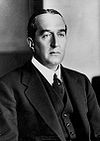
|
MP for Flinders, Vic, 1918–1929 (defeated) ; 1931–1933 (resigned) |
Nationalist (Coalition) |
9 February 1923 |
22 October 1929 |
1922 | 1st Bruce | |
| 1925 | 2nd Bruce | ||||||||
| 1928 | 3rd Bruce | ||||||||
| Elected 1925, 1928. Supported the British Empire, the League of Nations, and the White Australia Policy; Maritime Industries crisis. Defeated (and lost his own seat) 1929. | |||||||||
| rowspan="2" style="background:Template:Australian Labor Party/meta/color; color:white;" |9 | James Scullin (1876–1953) |
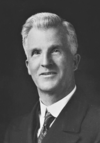
|
MP for Yarra, Vic, 1910–1949 (retired) |
Labor | 22 October 1929 |
6 January 1932 |
1929 | Scullin | |
| Elected 1929. Wall Street Crash of 1929 and Great Depression. The government split on economic issues, forcing a vote of no confidence; defeated 1931. | |||||||||
| rowspan="5" style="background:Template:Nationalist Party of Australia/meta/color; color:white;" |10 | Joseph Lyons (1879–1939) |

|
MP for Wilmot, Tas, 1929–1939 (died) |
United Australia (Coalition) |
6 January 1932 |
7 April 1939† |
1931 | 1st Lyons | |
| 1934 | 2nd Lyons | ||||||||
| — | 3rd Lyons | ||||||||
| 1937 | 4th Lyons | ||||||||
| Premier of Tasmania 1923–28. Elected 1931, 1934, 1937. Supported appeasement, but expanded the armed forces. †Died in office (heart attack). | |||||||||
| rowspan="2" style="background:Template:National Party of Australia/meta/color; color:white;" |11 | Sir Earle Page (1880–1961) |
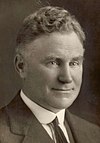
|
MP for Cowper, NSW 1919–1961 (defeated) |
Country (Coalition) |
7 April 1939 |
26 April 1939 |
— | Page | |
| Leader of the Country Party, junior member in the Lyons-Page Coalition Government. Appointed by the Governor-General as interim Prime Minister on Lyons' death, until United Australia elected a leader; refused to serve under Robert Menzies; overthrown as Country Party leader. | |||||||||
| rowspan="4" style="background:Template:Nationalist Party of Australia/meta/color; color:white;" |12 | Robert Menzies (1894–1978) |

|
MP for Kooyong, Vic, 1934–1966 (resigned) |
United Australia (Coalition) |
26 April 1939 |
28 August 1941 |
— | 1st Menzies | |
| 2nd Menzies | |||||||||
| 1940 | 3rd Menzies | ||||||||
| Minority government until the Country Party re-joined the government. 1940 election produced a hung parliament; remained in government only with independent support. Forced to resign. Established Australian Embassies in US and Japan. Outbreak of World War II: volunteer 2nd Australian Imperial Force raised. Australia fights in Mediterranean Theatre, halts Wermacht at Tobruk; Menzies spends time with Churchill's War Cabinet, seeks British reinforcements for Singapore, tours US and lobbies Washington to assist. | |||||||||
| rowspan="2" style="background:Template:National Party of Australia/meta/color; color:white;" |13 | Arthur Fadden (1895–1973) |

|
MP for Darling Downs, Qld 1936–1949 MP for McPherson, Qld 1949–1958 (retired) |
Country (Coalition) |
28 August 1941 |
7 October 1941 |
— | Fadden | |
| Leader of the Country Party, junior member in the Coalition Government. Appointed on Menzies' resignation. World War Two continues: British Empire stands alone against Hitler. Fadden calls on Australians to join in "supreme task of defeating the forces of evil in the world". ALP refuses war cabinet. Hung Parliament reliant on support of Independent MPs (Coles and Wilson); they voted against Fadden's budget. Resigned. | |||||||||
| rowspan="3" style="background:Template:Australian Labor Party/meta/color; color:white;" |14 | John Curtin (1885–1945) |

|
MP for Fremantle, WA, 1928–1931 (defeated) ; 1934–1945 (died) |
Labor | 7 October 1941 |
5 July 1945† |
— | 1st Curtin | |
| 1943 | 2nd Curtin | ||||||||
| Appointed by the Governor-General on condition that Independent MPs Coles and Wilson would support him, thereby ending government instability. Re-elected 1943. Led Australia through World War II. Pacific War begins: Fall of Singapore, Kokoda Campaign, Australia bombed by Japan. Curtin called Australia a "bastion of British institutions" but announced Australia "looks to America" for defence. US South West Pacific High Command based in Melbourne. Sends H. V. Evatt to represent Australia in discussions for formation of United Nations. †Died in office (heart attack). | |||||||||
| rowspan="2" style="background:Template:Australian Labor Party/meta/color; color:white;" |15 | Frank Forde (1890–1983) |

|
MP for Capricornia, Qld, 1922–1946 (defeated) |
Labor | 6 July 1945 |
13 July 1945 |
— | Forde | |
| Deputy Party Leader under Curtin. On Curtin's death, served as interim Prime Minister until Labor Party leadership election. Defeated by Ben Chifley in leadership election; reappointed Deputy Party Leader and appointed Minister for Defence. | |||||||||
| rowspan="3" style="background:Template:Australian Labor Party/meta/color; color:white;" |16 | Ben Chifley (1885–1951) |
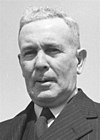
|
MP for Macquarie, NSW, 1928–1931 (defeated) ; 1940–1951 (died) |
Labor | 13 July 1945 |
19 December 1949 |
— | 1st Chifley | |
| 1946 | 2nd Chifley | ||||||||
| Defeated Frank Forde in Labor Party leadership election. Establishment of Australian citizenship; 1948 referendum to modify the Constitution; Snowy Mountains Scheme; foundation of airlines Qantas and TAA; social security scheme for the unemployed; reorganisation of CSIRO; foundation of ASIO; 1949 coal strike. Defeated 1949. | |||||||||
| rowspan="8" style="background:Template:Liberal Party of Australia/meta/color; color:white;" |(12) | Sir Robert Menzies (1894–1978) |

|
MP for Kooyong, Vic, 1934–1966 (resigned) |
Liberal (Coalition) |
19 December 1949 |
26 January 1966 |
1949 | 4th Menzies | |
| 1951 | 5th Menzies | ||||||||
| 1954 | 6th Menzies | ||||||||
| 1955 | 7th Menzies | ||||||||
| 1958 | 8th Menzies | ||||||||
| 1961 | 9th Menzies | ||||||||
| 1963 | 10th Menzies | ||||||||
| Cold War: ANZUS Treaty formalised US Alliance, referendum to ban the Communist Party during the Korean War, Defection of Vladimir Petrov, Malayan Emergency, Vietnam War, conscription. Voting rights extended to all indigenous Australians. Abolition of White Australia Policy's "Dictation Test", expanded immigration from Southern and Eastern Europe, Colombo Plan for development in Asia, trade with Japan, SEATO Defence Treaty. Extended economic prosperity, booming wool trade. Introduction of television. Investment in universities, development of Canberra. First Royal Tour by reigning monarch. Melbourne Olympics. | |||||||||
| rowspan="3" style="background:Template:Liberal Party of Australia/meta/color; color:white;" |17 | Harold Holt (1908–1967) |

|
MP for Fawkner, Vic, 1935–1949 |
Liberal (Coalition) |
26 January 1966 |
19 December 1967† |
— | 1st Holt | |
| 1966 | 2nd Holt | ||||||||
| Re-elected 1966. Cold War; Expanded Australia's role in Vietnam War. Referendum on inclusion of indigenous Australians in census. Migration Act 1966 opened Australia to multiethnic immigration. Decimalisation of Australian currency.†Disappeared while swimming at Cheviot Beach 17 December 1967; presumed dead 19 December. | |||||||||
| rowspan="2" style="background:Template:National Party of Australia/meta/color; color:white;" |18 | John McEwen (1900–1980) |

|
MP for Echuca, Vic, 1934–1937 Murray, Vic, 1949–1971 (resigned) |
Country (Coalition) |
19 December 1967 |
10 January 1968 |
— | McEwen | |
| Leader of the Country Party, junior member in the Menzies-Holt Coalition Government. Appointed by the Governor-General on Holt's disappearance, as interim Prime Minister until the Liberals elected a leader; refused to serve under the obvious candidate William McMahon. John Gorton selected instead. | |||||||||
| rowspan="3" style="background:Template:Liberal Party of Australia/meta/color; color:white;" |19 | John Gorton (1911–2002) |

|
Senator 1950–1968 (resigned) |
Liberal (Coalition) |
10 January 1968 |
10 March 1971 |
— | 1st Gorton | |
| 1969 | 2nd Gorton | ||||||||
| The only Senator to serve as Prime Minister; resigned from the Senate and elected MP. Re-elected 1969. Arts funding increased, Australian Council for the Arts, the Australian Film Development Corporation & National Film and Television Training School established. Free health care for the poor. Continued involvement in Vietnam War, conscripts removed, replacement of troops ended 1970. Resigned after a leadership ballot produced a tied vote. | |||||||||
| rowspan="2" style="background:Template:Liberal Party of Australia/meta/color; color:white;" |20 | William McMahon (1908–1988) |

|
MP for Lowe, NSW, 1949–1982 (resigned) |
Liberal (Coalition) |
10 March 1971 |
5 December 1972 |
— | McMahon | |
| Continued to support conscription and involvement in Vietnam War. Neville Bonner becomes first Aboriginal in Parliament. Defeated 1972. | |||||||||
| rowspan="4" style="background:Template:Australian Labor Party/meta/color; color:white;" |21 | Gough Whitlam (1916– ) |
File:Whitlam1955.jpg | MP for Werriwa, NSW, 1952–1978 (resigned) |
Labor | 5 December 1972 |
11 November 1975 |
1972 | 1st Whitlam | |
| — | 2nd Whitlam | ||||||||
| 1974 | 3rd Whitlam | ||||||||
| Abolished conscription. Withdrew remaining troops from Vietnam. Negotiated diplomatic relationship with China. Established universal health scheme (Medibank). Abolished most university fees. Set up legal aid programs. Extended funding to arts and film industry. Cut import tariffs by 25% and abolished tax on contraceptive pill. Granted independence to Papua New Guinea. Initiated reforms for aboriginal land ownership. Removed final vestiges and fully abolished White Australia Policy. Introduced Racial Discrimination Act. Legislated no-fault divorce. 1973 oil crisis, increasing unemployment, inflation. Large expansion of expenditure in 1974 Budget, Treasurer Crean replaced by Jim Cairns. Loans Affair - Cairns misleads Parliament, resigns. Opposition blocks supply in Senate. Whitlam becomes only Prime Minister to be dismissed (at climax of 1975 Constitutional Crisis). | |||||||||
| rowspan="5" style="background:Template:Liberal Party of Australia/meta/color; color:white;" |22 | Malcolm Fraser (1930– ) |
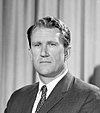
|
MP for Wannon, Vic, 1955–1983 (resigned) |
Liberal (Coalition) |
11 November 1975 |
11 March 1983 |
— | 1st Fraser | |
| 1975 | 2nd Fraser | ||||||||
| 1977 | 3rd Fraser | ||||||||
| 1980 | 4th Fraser | ||||||||
| Constitutional Crisis 1975. Historic landslide election victory. Reduced inflation levels. Multiculturalism, Vietnamese Refugees, SBS, Aboriginal Land Rights Act 1976. Opposed white minority rule in Apartheid South Africa and Rhodesia. Opposed Soviet expansionism, sought good relations with post-Mao China. Recognition of Indonesia's annexation of East Timor. Early 1980s recession and drought. | |||||||||
| rowspan="5" style="background:Template:Australian Labor Party/meta/color; color:white;" |23 | Bob Hawke (1929– ) |
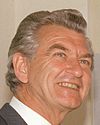
|
MP for Wills, Vic, 1980–1992 (resigned) |
Labor | 11 March 1983 |
20 December 1991 |
1983 | 1st Hawke | |
| 1984 | 2nd Hawke | ||||||||
| 1987 | 3rd Hawke | ||||||||
| 1990 | 4th Hawke | ||||||||
| Creation of an "inner" cabinet, dismantled the tariff system, privatised state sector industries, ended subsidisation of loss-making industries, and sold off the state-owned Commonwealth Bank of Australia. Introduction of fringe benefits tax and a capital gains tax, Australian pilot's strike 1989, reintroduction of Medibank (under the name Medicare), introduction of occupational superannuation, a boost in school retention rates, a focus on young people’s job skills, a doubling of subsidised home care services, the elimination of poverty traps in the welfare system, a 50% increase in public housing funds, an increase in the real value of the pension, the development of a new youth support program, a dramatic improvement in education retention rates, the re-introduction of six-monthly indexation of single adult unemployment benefits, and significant improvements in social security provisions. Australia's public health campaign, early 1990s recession, Gulf War, Defeated in a leadership challenge by Paul Keating. Resigned. | |||||||||
| rowspan="3" style="background:Template:Australian Labor Party/meta/color; color:white;" |24 | Paul Keating (1944– ) |
File:TreasurerKeating.jpg | MP for Blaxland, NSW, 1969–1996 (resigned) |
Labor | 20 December 1991 |
11 March 1996 |
— | 1st Keating | |
| 1993 | 2nd Keating | ||||||||
| Defeats Hawke in Leadership Spill. Re-elected 1993. Mandatory detention of asylum seekers; Reconciliation with Aborigines, including Redfern Park Speech and Native Title Act 1993; Established the Republic Advisory Committee; Relations with Asia, through APEC. In 1992 introduced a compulsory "Superannuation Guarantee" system as part of a major reform package addressing Australia's retirement income policies. Defeated 1996. | |||||||||
| rowspan="5" style="background:Template:Liberal Party of Australia/meta/color; color:white;" |25 | John Howard (1939– ) |
File:Johnhoward.jpg | MP for Bennelong, NSW, 1974–2007 (defeated) |
Liberal (Coalition) |
11 March 1996 |
3 December 2007 |
1996 | 1st Howard | |
| 1998 | 2nd Howard | ||||||||
| 2001 | 3rd Howard | ||||||||
| 2004 | 4th Howard | ||||||||
| Defeated 1987. Elected 1996, 1998, 2001, 2004. Defeated (and lost his own seat) 2007. 1996 Gun Control legislation, Wik legislation, waterfront reform. 1999 East Timor INTERFET mission, Wars in Iraq and Afghanistan, RAMSI mision to Solomon Islands, 2004 Tsunami aid effort. Pacific Solution asylum Policy, expansion of overall immigration intake. 1998 Constitutional Convention, 1999 Republic referendum & proposed amendment of Constitutional Preamble to include recognition of indigenous Australians (both proposals rejected in vote). 1999 Motion of Reconciliation, 2007 Northern Territory Intervention. Asian Financial Crisis aid effort, repeated tax cuts, introduction of GST, debt reduction, privatisation of Telstra, Corporate Law Economic Reform Program, expanded China and Asia trade. WorkChoices deregulation of industrial relations. Introduction of the Baby bonus, superannuation reform for same-sex couples. Record $46.7 billion dollars in health funding in 2006-2007, extension of broadband internet and mobile phone connections to rural and regional areas. | |||||||||
| rowspan="2" style="background:Template:Australian Labor Party/meta/color; color:white;" |26 | Kevin Rudd (1957– ) |
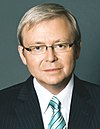
|
MP for Griffith, Qld, since 1998 |
Labor | 3 December 2007 |
24 June 2010 |
2007 | 1st Rudd | |
| Elected 2007. Signed Kyoto Protocol; Issued apology to the Stolen Generations; Withdrew troops from Iraq War; Abolished previous government's WorkChoices industrial legislation; dismantled Pacific Solution; Upheld Australian involvement in War in Afghanistan. Home Insulation Program issue. Resource Super Profit Tax issue. Emissions Trading Scheme proposals. Challenged for the leadership of the Labor Party by Deputy Prime Minister Julia Gillard; resigned. | |||||||||
| rowspan="3" style="background:Template:Australian Labor Party/meta/color; color:white;" |27 | Julia Gillard (1961– ) |

|
MP for Lalor, Vic, 1998–2013 (retired) |
Labor | 24 June 2010 |
27 June 2013 |
— | 1st Gillard | |
| 2010 | 2nd Gillard | ||||||||
| Challenged Kevin Rudd as Leader of the Labor Party in a leadership spill. First female Australian Prime Minister. Subsequent election resulted in a hung parliament with a minority government formed with support by the Greens and Independents. Implemented Clean Energy Act 2011, Mineral Resource Rent Tax and the Queensland Flood Levy (for 2010–11 flood damage). Overturned a ban on the sale of uranium to India despite the latter not being a signatory to the NPT. Introduced plain cigarette packaging, Murray Darling Basin Plan and won seat on United Nations Security Council. Established the Royal Commission into Institutional Responses to Child Sexual Abuse and apologised to the victims of Forced adoption in Australia. Re-established offshore processing of Asylum Seekers. Initiated National Disability Insurance Scheme. Initiated Gonski school funding reforms. Defeated Kevin Rudd again in 2012 leadership spill, and elected unopposed in March 2013 leadership spill. On 26 June 2013, Kevin Rudd defeated Julia Gillard in another leadership spill in the Labor Party. | |||||||||
| rowspan="2" style="background:Template:Australian Labor Party/meta/color; color:white;" |(26) | Kevin Rudd (1957– ) |

|
MP for Griffith, Qld, since 1998 |
Labor | 27 June 2013 |
18 September 2013 |
— | 2nd Rudd | |
| Won June 2013 leadership spill. Asylum seeker deal with the Prime Minister of Papua New Guinea (Peter O'Neill) and the President of Nauru (Baron Waqa). First Australian prime minister to publicly support same-sex marriage. Served less than three months, as Labor lost the 2013 federal election. | |||||||||
| rowspan="2" style="background:Template:Liberal Party of Australia/meta/color; color:white;" |28 | Tony Abbott (1957– ) |
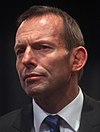
|
MP for Warringah, NSW, since 1994 |
Liberal (Coalition) |
18 September 2013 |
Incumbent | 2013 | Abbott | |
| Elected 2013. Operation Sovereign Borders initiative to stop boats carrying asylum seekers. | |||||||||
See also
Footnotes
- ^ The Electoral Division of Ballaarat was spelled with a double a until 1977.
- Holt went missing on 17 December 1967. On 19 December he was declared presumed dead and his commission as Prime Minister was terminated on that day. In 2005 the Victorian Coroner ruled that he had in fact drowned on 17 December.
- Gorton was elected to the Senate at the general election of 10 December 1949, but his term did not commence until 22 February 1950. He was appointed Prime Minister on 10 January 1968; resigned from the Senate on 1 February; and was elected to the House of Representatives at a by-election on 24 February.
- Gorton retired from the House of Representatives at the double dissolution of 11 November 1975, and stood for an Australian Capital Territory Senate seat as an independent at the general election of 13 December 1975, but was unsuccessful.
References
- Rutledge, Martha. "Barton, Sir Edmund (1849–1920)". Australian Dictionary of Biography. Australian National University. Retrieved 21 October 2008.
- Norris, R. (1981). "Deakin, Alfred (1856–1919)". Australian Dictionary of Biography. Canberra: National Centre of Biography, Australian National University. ISBN 978-0-522-84459-7. ISSN 1833-7538. OCLC 70677943. Retrieved 21 October 2008.
- Nairn, Bede (1990). "Watson, John Christian (1867–1941)". Australian Dictionary of Biography. Canberra: National Centre of Biography, Australian National University. ISBN 978-0-522-84459-7. ISSN 1833-7538. OCLC 70677943. Retrieved 21 October 2008.
- McMinn, W. G. "Reid, Sir George Houstoun (1845–1918)". Australian Dictionary of Biography. Australian National University. Retrieved 21 October 2008.
- Murphy, D. J. "Fisher, Andrew (1862–1928)". Australian Dictionary of Biography. Australian National University. Retrieved 21 October 2008.
- Crowley, F. K. "Cook, Sir Joseph (1860–1947)". Australian Dictionary of Biography. Australian National University. Retrieved 21 October 2008.
- Fitzhardinge, L. F. "Hughes, William Morris (Billy) (1862–1952)". Australian Dictionary of Biography. Australian National University. Retrieved 21 October 2008.
- Radi, Heather (1979). "Bruce, Stanley Melbourne (1883–1967)". Australian Dictionary of Biography. Canberra: National Centre of Biography, Australian National University. ISBN 978-0-522-84459-7. ISSN 1833-7538. OCLC 70677943. Retrieved 21 October 2008.
- Robertson, J. R. (1988). "Scullin, James Henry (1876–1953)". Australian Dictionary of Biography. Canberra: National Centre of Biography, Australian National University. ISBN 978-0-522-84459-7. ISSN 1833-7538. OCLC 70677943. Retrieved 21 October 2008.
- Hart, P. R. (1986). "Lyons, Joseph Aloysius (1879–1939)". Australian Dictionary of Biography. Canberra: National Centre of Biography, Australian National University. ISBN 978-0-522-84459-7. ISSN 1833-7538. OCLC 70677943. Retrieved 21 October 2008.
{{cite encyclopedia}}: Unknown parameter|coauthors=ignored (|author=suggested) (help) - Bridge, Carl. "Page, Sir Earle Christmas Grafton (1880–1961)". Australian Dictionary of Biography. Canberra: National Centre of Biography, Australian National University. ISBN 978-0-522-84459-7. ISSN 1833-7538. OCLC 70677943. Retrieved 21 October 2008.
- Martin, A. W. "Menzies, Sir Robert Gordon (Bob) (1894–1978)". Australian Dictionary of Biography. Canberra: National Centre of Biography, Australian National University. ISBN 978-0-522-84459-7. ISSN 1833-7538. OCLC 70677943. Retrieved 22 November 2008.
- Cribb, Margaret Bridson. "Fadden, Sir Arthur William (1894–1973)". Australian Dictionary of Biography. Canberra: National Centre of Biography, Australian National University. ISBN 978-0-522-84459-7. ISSN 1833-7538. OCLC 70677943. Retrieved 22 November 2008.
External links
| Prime ministers of Australia (list) | |
|---|---|
| Lists related to prime ministers of Australia | |||
|---|---|---|---|
| Premiership |
| ||
| Personal life | |||